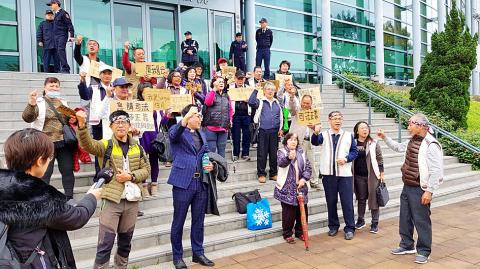Leaders of Siraya communities yesterday told the Taipei High Administrative Court that the Council of Indigenous Peoples was working to deny recognition of their people and refusing to grant them indigenous status.
Council-appointed lawyer Chen Ching-wei (陳敬暐) said the Siraya people do not meet the requirements to have indigenous status, citing provisions of the Status Act for Indigenous Peoples (原住民身分法).
The act and its amendments were designed to protect the rights of specific groups and provide state resources to recognized communities.

Photo: Wen Yu-te, Taipei Times
Tainan Siraya Culture Association secretary-general Uma Talavan (萬淑娟) said that when President Tsai Ing-wen (蔡英文) issued her historic official apology to all of Taiwan’s indigenous peoples on Aug. 1, 2016, she promised to recognize Pingpu Aboriginal groups and include them as indigenous peoples under the council.
Uma appealed to Tsai to keep her promise, saying that council officials have continued to deny the Siraya indigenous status and exclude them from the council, countering the president’s stated policy in breach of the Constitution.
Uma and more than 300 registered Siraya descendants in 2015 filed the lawsuit to obtain indigenous status, saying that the council’s actions to deny their recognition violated their rights, as it is not for the government to define indigenous peoples.
In doing so, the government and the council have breached international conventions and the UN Declaration on the Rights of Indigenous Peoples, the lawsuit says.
The council, established in 1996, is the highest central government body tasked with protecting the rights, and providing social welfare and benefits to Taiwan’s indigenous groups.
At its inception, the council oversaw policies for nine Aboriginal groups, which the Chinese Nationalist Party (KMT) called “mountain compatriots”: the Amis, Atayal, Bunun, Paiwan, Puyuma, Rukai, Saisiyat, Tao and Tsou peoples.
Since then, the government has added the Thao, Kavalan, Truku, Sakizaya, Sediq, Hla’alua and Kanakanavu communities to the list of recognized Aboriginal groups.
However, over the past two decades, the government has steadfastly refused to recognize the Siraya and other Pingpu groups as indigenous peoples. The council has excluded them and rejected their demands for recognition.
While the Siraya lost a first ruling in a lower court, they appealed and the Supreme Administrative Court last year ordered a retrial, with judges saying that “indigenous people and their ethnic status is derived from family bloodline; they were born with it. It is not granted by the government’s authority, nor is it given by registration at a government office... Therefore, a retrial is ordered, requiring further review and investigation.”
Besides the Siraya, the other Pingpu groups, who live in rural areas in clan-based village communities, include the Babuza, Hoanya, Kaxabu, Ketagalan, Makatao, Pazeh, Papora, Taokas and Tavorlong communities.

The brilliant blue waters, thick foliage and bucolic atmosphere on this seemingly idyllic archipelago deep in the Pacific Ocean belie the key role it now plays in a titanic geopolitical struggle. Palau is again on the front line as China, and the US and its allies prepare their forces in an intensifying contest for control over the Asia-Pacific region. The democratic nation of just 17,000 people hosts US-controlled airstrips and soon-to-be-completed radar installations that the US military describes as “critical” to monitoring vast swathes of water and airspace. It is also a key piece of the second island chain, a string of

A magnitude 5.9 earthquake that struck about 33km off the coast of Hualien City was the "main shock" in a series of quakes in the area, with aftershocks expected over the next three days, the Central Weather Administration (CWA) said yesterday. Prior to the magnitude 5.9 quake shaking most of Taiwan at 6:53pm yesterday, six other earthquakes stronger than a magnitude of 4, starting with a magnitude 5.5 quake at 6:09pm, occurred in the area. CWA Seismological Center Director Wu Chien-fu (吳健富) confirmed that the quakes were all part of the same series and that the magnitude 5.5 temblor was

The Central Weather Administration has issued a heat alert for southeastern Taiwan, warning of temperatures as high as 36°C today, while alerting some coastal areas of strong winds later in the day. Kaohsiung’s Neimen District (內門) and Pingtung County’s Neipu Township (內埔) are under an orange heat alert, which warns of temperatures as high as 36°C for three consecutive days, the CWA said, citing southwest winds. The heat would also extend to Tainan’s Nansi (楠西) and Yujing (玉井) districts, as well as Pingtung’s Gaoshu (高樹), Yanpu (鹽埔) and Majia (瑪家) townships, it said, forecasting highs of up to 36°C in those areas

IN FULL SWING: Recall drives against lawmakers in Hualien, Taoyuan and Hsinchu have reached the second-stage threshold, the campaigners said Campaigners in a recall petition against Chinese Nationalist Party (KMT) Legislator Yen Kuan-heng (顏寬恒) in Taichung yesterday said their signature target is within sight, and that they need a big push to collect about 500 more signatures from locals to reach the second-stage threshold. Recall campaigns against KMT lawmakers Johnny Chiang (江啟臣), Yang Chiung-ying (楊瓊瓔) and Lo Ting-wei (羅廷瑋) are also close to the 10 percent threshold, and campaigners are mounting a final push this week. They need about 800 signatures against Chiang and about 2,000 against Yang. Campaigners seeking to recall Lo said they had reached the threshold figure over the